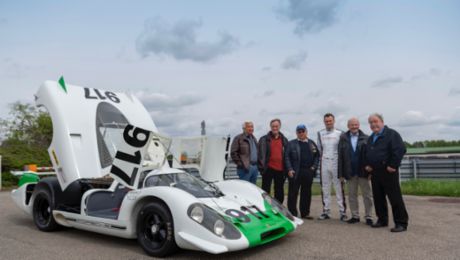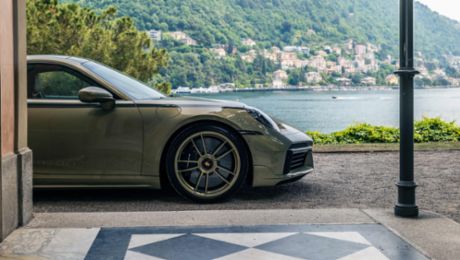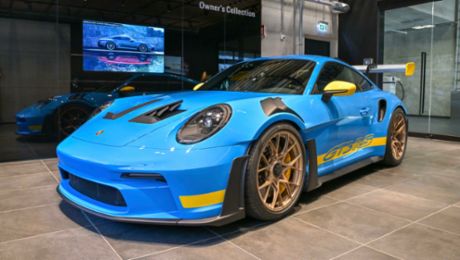This was the first race win for the 917, which was initially considered difficult to drive due to the high speeds and aerodynamics. The experts at Porsche Exclusive Manufaktur built the extraordinary one-off as part of the Sonderwunsch programme. The vehicle will go on display at the Swiss Porsche centres in August 2024 before going on to be one of the highlights of the “Auto Zürich” trade fair (7 to 10 November 2024). The buyer will be selected at random from all interested parties.
Joseph “Jo” Siffert continues to enjoy cult status in Switzerland 50 years after his death. The Fribourg native was an extremely talented, charismatic racing driver. Siffert lived out his passion for motorsport with legendary intensity, contesting 298 races over 11 years. Sometimes he took part in several races during the same weekend. “Jo Siffert, together with Kurt Ahrens, kicked off the success story of the 917 by winning at Zeltweg in 1969. The passion with which he has pursued his dream of racing is still impressive today and fits perfectly with our brand core – Driven by Dreams,” says Michael Glinski, Chief Executive Officer of Porsche Schweiz AG.
The family of Jo Siffert was closely involved in the construction of this very special 911 GT3 RS. In addition to his son Philippe, who drove Formula Ford and Formula 3 races between 1991 and 2003 and was a works driver at BMW, his grandson Jérémy Siffert also attended the project workshop in Zuffenhausen. “To witness the creation of this Porsche in honour of my father was extremely exciting,” says Philippe Siffert. “With painstaking attention to historical details and craftsmanship of the highest quality, the employees of the Porsche Sonderwunsch Manufaktur have transformed an already rare 911 GT3 RS into an absolutely unique piece – infused with the spirit of Jo Siffert.”
Countless nods to the Porsche 917
“This tribute model is an inspirational car in two senses: on the one hand, its visual design is based on the design of the 917 with which Jo Siffert and Kurt Ahrens drove to victory at the Österreichring almost 55 years ago,” says Alexander Fabig, Vice President Individualisation & Classic at Porsche AG. “On the other hand, the one-off shows the extensive exterior and interior customisation options that we offer as part of the Sonderwunsch programme.”
The car is predominantly painted in Pure White and, like the car that inspired it, features Viper Green contrast sections on the front wings and parts of the front end. Both colours come from the “Paint to Sample” programme. The middle section of its large rear wing is also painted in this shade of green. The start number is the same as the one used in the inaugural 1,000-kilometre race. The “29” is reprised on the doors, the front bonnet, under the rear wing and on the valve caps on the tyres. The classic Porsche lettering with striped design on the doors and side sections was also inspired by the original vehicle.
With great attention to detail and the able support of Bosch and Shell, the Porsche design experts also reproduced the contemporary sponsor decals. The Bosch decal with the spark plug is positioned on the rear wheel arches. The Shell decal with the wordmark in the shell is positioned below the rear window by the service flaps for oil and coolant.
The silhouette of the 917KH can be seen on the centre lock of the satin black magnesium wheels; this stylised side view also adorns the sideplates of the rear wing. A special badge in the helmet design is positioned on the B-pillars: as a personal reference, the name and signature of Jo Siffert are represented there.
The interior exudes a tasteful racing atmosphere: Race-Tex dominates in Black and Guards Red. The helmet motif is embroidered in the headrests. The door entry guards are adorned with the 917 silhouette combined with the signature. Even the vehicle key has been painstakingly customised: the side bolsters are painted in Pure White or in the modern Viper Green, with the 917 silhouette printed in the respective contrasting colour. Jo Siffert’s autograph is embossed on the cover of the centre console and in the leather key case.
About the Porsche 917 with Jo Siffert at the wheel
“We owe the 1969 World Sportscar Championship in large part to Jo Siffert. He was by far the fastest man on our team,” former senior race engineer Peter Falk recalled of the Swiss in 2018. Porsche won seven out of ten races that season. Siffert took five of these victories together with the Briton Brian Redman and one with Kurt Ahrens – the one on 10 August 1969 in Zeltweg. “Our victory in Zeltweg was the start of the success story of the 917 and it was a great pleasure and honour for me to be able to share the cockpit with Jo,” says his companion Ahrens.
.jpg/jcr:content/HDI-63855_1_29_-Jo-Siffert-und-Kurt-Ahrens-auf-dem-%C3%96sterreichring-am-10.8.1969-mit-917-KH-(1.Pl.Ges.kl).jpg)
In 1968, the FIA had surprisingly changed the regulations of the Manufacturer’s World Championship and increased the displacement limit to five litres – and the number of units required for homologation had been reduced to 25 cars. The three-litre Porsche 908 was no longer truly competitive. A new five-litre car was called for – the 917. Today, its record of success is legendary: after taking the Sports Car World Championship title in its maiden campaign in 1969, Hans Herrmann and Richard Attwood achieved the coveted triumph at Le Mans in 1970. Helmut Marko and Gijs van Lennep were able to repeat this greatest motorsport triumph for Porsche in 1971. George Follmer, in 1972, and Mark Donohue, in 1973, dominated the North American CanAm series with the over 1,000-PS turbo versions 917/10 and 917/30, further developments of the 917.
Jo Siffert would not have the chance to witness these later events: after his Porsche career, he died in a fatal accident at the age of 35 at the Formula 1 race at Brands Hatch (UK) on 24 October 1971.
About the Sonderwunsch programme
Porsche is reinterpreting its legendary Sonderwunsch programme from the late 1970s, which will enable it to design individualised, one-off cars – co-created by the customer and professionally produced by Porsche. The expanded range is divided into the installation of specific colour and material requests directly during production as well as subsequent refinements and even custom vehicle concepts on customer request after delivery – regardless of the age of the vehicle.
Customers can contact their Porsche Centre for customisations on new cars. If the request is beyond the bounds of the Exclusive Manufaktur options offered in the Car Configurator, the Sonderwunsch process kicks into gear with an arranged personal customer consultation at Zuffenhausen or one of the international locations, such as Atlanta or Los Angeles. Here, the manufacturer’s experts are dedicated to the prompt assessment and technical approval of individual customer requirements.


